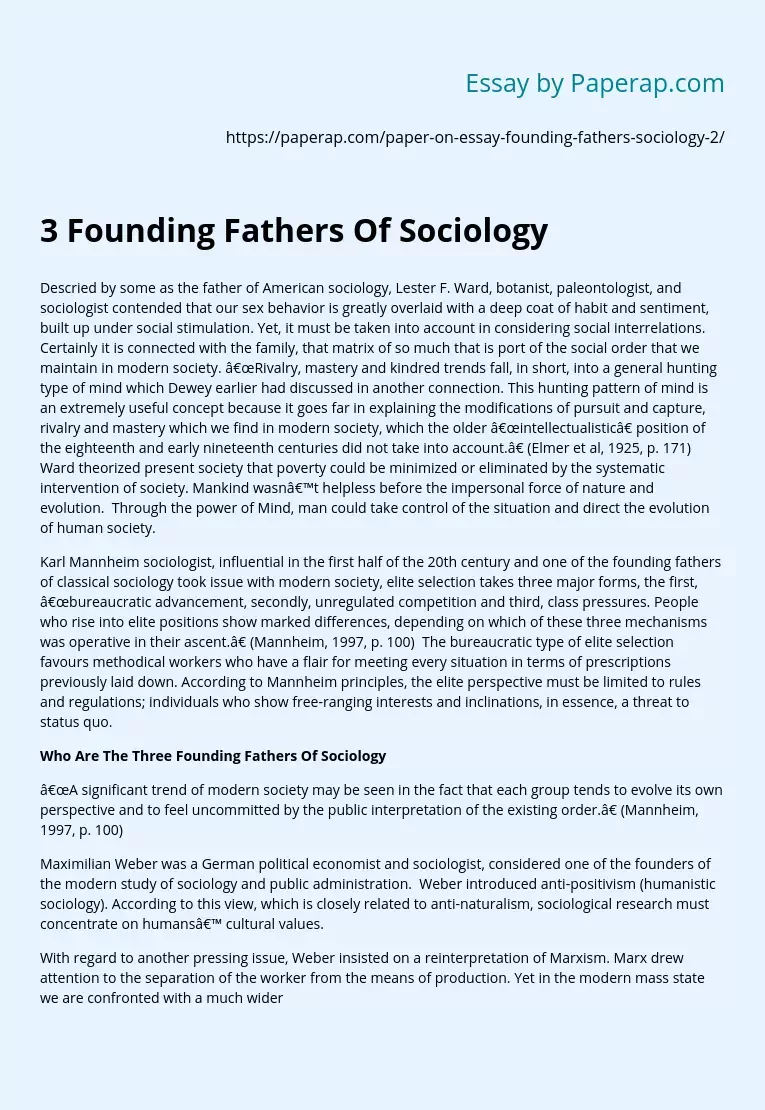3 Founding Fathers Of Sociology
Descried by some as the father of American sociology, Lester F. Ward, botanist, paleontologist, and sociologist contended that our sex behavior is greatly overlaid with a deep coat of habit and sentiment, built up under social stimulation. Yet, it must be taken into account in considering social interrelations. Certainly it is connected with the family, that matrix of so much that is port of the social order that we maintain in modern society. “Rivalry, mastery and kindred trends fall, in short, into a general hunting type of mind which Dewey earlier had discussed in another connection.
This hunting pattern of mind is an extremely useful concept because it goes far in explaining the modifications of pursuit and capture, rivalry and mastery which we find in modern society, which the older “intellectualistic” position of the eighteenth and early nineteenth centuries did not take into account.” (Elmer et al, 1925, p. 171) Ward theorized present society that poverty could be minimized or eliminated by the systematic intervention of society.
Mankind wasn’t helpless before the impersonal force of nature and evolution. Through the power of Mind, man could take control of the situation and direct the evolution of human society.
Karl Mannheim sociologist, influential in the first half of the 20th century and one of the founding fathers of classical sociology took issue with modern society, elite selection takes three major forms, the first, “bureaucratic advancement, secondly, unregulated competition and third, class pressures. People who rise into elite positions show marked differences, depending on which of these three mechanisms was operative in their ascent.
” (Mannheim, 1997, p. 100) The bureaucratic type of elite selection favours methodical workers who have a flair for meeting every situation in terms of prescriptions previously laid down. According to Mannheim principles, the elite perspective must be limited to rules and regulations; individuals who show free-ranging interests and inclinations, in essence, a threat to status quo.
Who Are The Three Founding Fathers Of Sociology
“A significant trend of modern society may be seen in the fact that each group tends to evolve its own perspective and to feel uncommitted by the public interpretation of the existing order.” (Mannheim, 1997, p. 100)
Maximilian Weber was a German political economist and sociologist, considered one of the founders of the modern study of sociology and public administration. Weber introduced anti-positivism (humanistic sociology). According to this view, which is closely related to anti-naturalism, sociological research must concentrate on humans’ cultural values.
With regard to another pressing issue, Weber insisted on a reinterpretation of Marxism. Marx drew attention to the separation of the worker from the means of production. Yet in the modern mass state we are confronted with a much wider phenomenon. “As it is a simplification to regard the proletariat as a simple homogeneous mass without any differentiations in skill, traditions, behaviour patterns, and social aspirations, so it would be wrong to assume that the proletariat forms ‘the majority’ of the employed population within the modern highly industrialized state. On both these points Weber insisted and thereby considerably corrected the traditional Marxian interpretation of modern society.” (Mayer, 1956, p. 80)
Karl Marx, an immensely influential German philosopher, political economist, and revolutionary conveyed proof that in modern society vice is indispensable and useful. This was by no means an apology of modern society. For the proletarians . . . the condition of their existence, labor, and with it all the conditions of existence governing modern society, have become something accidental, something over which they, as separate individuals, have no control, and over which no social organization can give them control. “The contradiction between the individuality of each separate proletarian and labor, the condition of life forced upon him, becomes evident to him himself, for he is sacrificed from youth upward and, within his own class, has no chance of arriving at the conditions which would place him in the other class.” (Bender, 1986, p. 323)
In The Protestant Ethic and the Spirit of Capitalism, (series of essays on religion) Weber puts forward the thesis that the Puritan ethic and ideas influenced the development of capitalism, the foundation of American society. This theory is often viewed as a reversal of Marx’s thesis that the economic “base” of society determines all other aspects of it. Religious devotion has usually been accompanied by rejection of mundane affairs, including economic pursuit.
The continuation of Weber’s interpretation of varying idealologies is not less relevant.
3 Founding Fathers Of Sociology. (2019, Dec 05). Retrieved from https://paperap.com/paper-on-essay-founding-fathers-sociology-2/

